8 Mar 2016 | About Index, Awards, Campaigns, mobile, News and features
From a journalist who trains women to tell the story of Syria’s civil war and a comedian who uses her routines to campaign for women’s rights in Indonesia, to a women-led campaigning group taking on the fight against internet censorship in Pakistan, the shortlist for the 2016 Index on Censorship Freedom of Expression Awards showcases women with leadership and bravery.
On International Women’s Day we celebrate the amazing women on our shortlist.
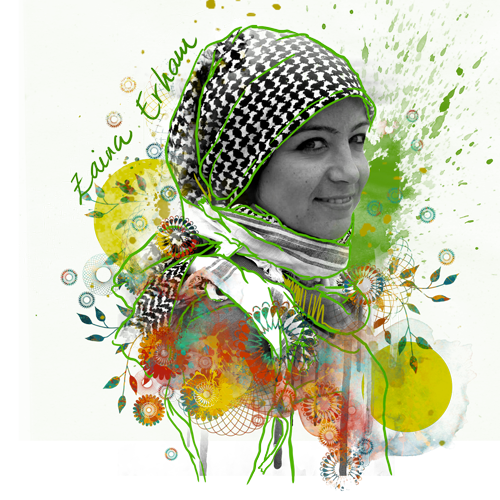 While many fled, Syrian-native journalist Zaina Erhaim returned to her war-ravaged country in 2013 to ensure those left behind were not forgotten. She is now one of the few female journalists braving the twin threat of violence from both IS and Syrian president, Bashar al-Assad.
While many fled, Syrian-native journalist Zaina Erhaim returned to her war-ravaged country in 2013 to ensure those left behind were not forgotten. She is now one of the few female journalists braving the twin threat of violence from both IS and Syrian president, Bashar al-Assad.
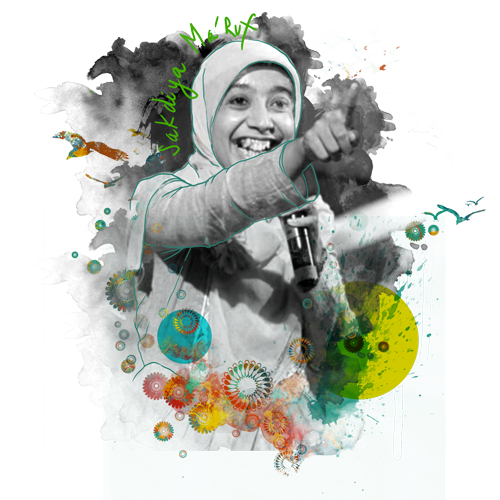 Arts nominee Sakdiyah Ma’ruf is a stand-up comedian from Indonesia whose routines challenge Islamic fundamentalism. Born to a conservative Muslim family in Java, Ma’ruf went against her father’s wishes and started using comedy to speak about religious-based violence and extremism, ethnic extremism and xenophobia, as well as fear, terror and violence against women.
Arts nominee Sakdiyah Ma’ruf is a stand-up comedian from Indonesia whose routines challenge Islamic fundamentalism. Born to a conservative Muslim family in Java, Ma’ruf went against her father’s wishes and started using comedy to speak about religious-based violence and extremism, ethnic extremism and xenophobia, as well as fear, terror and violence against women.
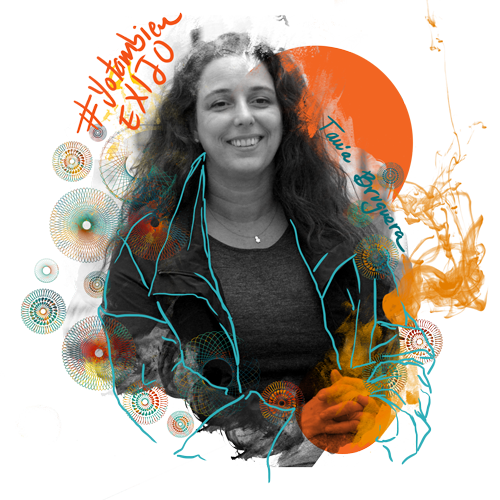 Artist Tania Bruguera was arrested after an attempt to stage her performance piece #YoTambienExijo in Havana in late 2014. Mounted soon after the apparent thaw in US-Cuban relations, Bruguera’s piece offered members of the public the chance of one minute of “censor-free” expression in Havana’s Plaza de la Revolución.
Artist Tania Bruguera was arrested after an attempt to stage her performance piece #YoTambienExijo in Havana in late 2014. Mounted soon after the apparent thaw in US-Cuban relations, Bruguera’s piece offered members of the public the chance of one minute of “censor-free” expression in Havana’s Plaza de la Revolución.
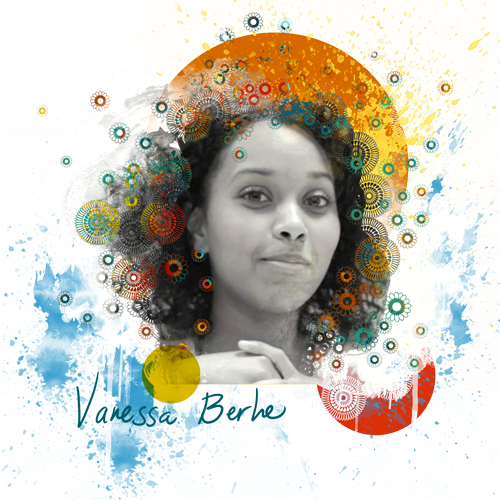 Campaigning nominee nineteen-year-old Vanessa Berhe continues to fight for the release of her uncle, journalist Seyoum Tsehaye, who has been imprisoned in Eritrea for the last 15 years. She also launched the campaign Free Eritrea to draw the world’s attention to a little-reported country with one of the worst track records for free speech.
Campaigning nominee nineteen-year-old Vanessa Berhe continues to fight for the release of her uncle, journalist Seyoum Tsehaye, who has been imprisoned in Eritrea for the last 15 years. She also launched the campaign Free Eritrea to draw the world’s attention to a little-reported country with one of the worst track records for free speech.
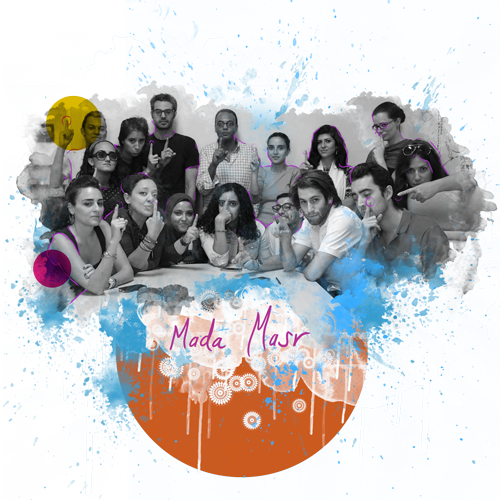 Lina Attalah, chief editor, is just one of the women and men — friends and journalists — who in 2013 founded an independent news collective Mada Masr after newspaper Egypt Independent was censored into bankruptcy. Mada Masr was launched as a media co-operative that aims to hold those in power accountable.
Lina Attalah, chief editor, is just one of the women and men — friends and journalists — who in 2013 founded an independent news collective Mada Masr after newspaper Egypt Independent was censored into bankruptcy. Mada Masr was launched as a media co-operative that aims to hold those in power accountable.
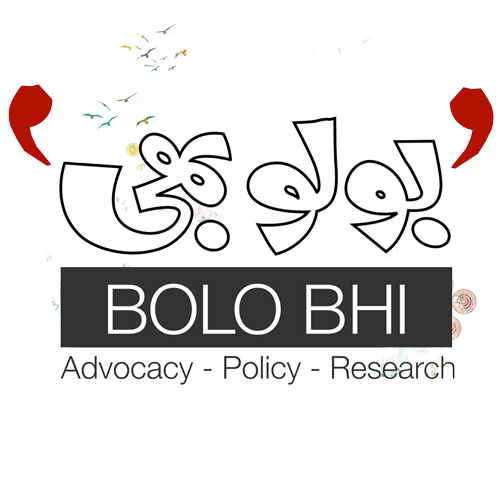 Bolo Bhi are a digital campaigning group who have orchestrated an impressive ongoing fight against attempts to censor the internet in Pakistan. The all-women management team have launched internet freedom programmes, published research papers, tirelessly fought for government transparency and run numerous innovative digital security training programmes.
Bolo Bhi are a digital campaigning group who have orchestrated an impressive ongoing fight against attempts to censor the internet in Pakistan. The all-women management team have launched internet freedom programmes, published research papers, tirelessly fought for government transparency and run numerous innovative digital security training programmes.
 Belarus Free Theatre, co-founded by Natalia Kaliada, have been using their creative and subversive art to protest the dictatorial rule of Aleksandr Lukashenko for a decade. Despite pressure from authorities since their inception, the group thrived underground, with performances in apartments, basements and forests despite continued arrests and brutal interrogations. In 2011, while on tour, they were told they were unable to return home. Refusing to be silenced, the group set up headquarters in London and continued to direct projects in Belarus.
Belarus Free Theatre, co-founded by Natalia Kaliada, have been using their creative and subversive art to protest the dictatorial rule of Aleksandr Lukashenko for a decade. Despite pressure from authorities since their inception, the group thrived underground, with performances in apartments, basements and forests despite continued arrests and brutal interrogations. In 2011, while on tour, they were told they were unable to return home. Refusing to be silenced, the group set up headquarters in London and continued to direct projects in Belarus.
This year, the Index awards gala on 13 April will be hosted by stand-up comedian and writer Shazia Mirza, whose outspoken and taboo-busting comedy explores Islamic fundamentalism and women’s rights. Mirza is fresh from her sell-out London run and in the midst of her current UK tour.
This article was published on 8 March 2016 at indexoncensorship.org
23 Mar 2011 | News and features
Digital activism has long been a way of life in Egypt; from monitoring political corruption to protesting against police brutality
(more…)
23 Mar 2011 | Egypt, Middle East and North Africa
Digital activism has long been a way of life in Egypt; from monitoring political corruption to protesting against police brutality
Egypt has always been one of the fastest and most enthusiastic cultures in the Middle East to embrace technology. Activist Egyptian bloggers such as Wael Abbas made their reputation by posting incendiary videos showing endemic police brutality and the use of torture in interrogation. In at least two cases, evidence of torture was circulated online and led to the prosecution of police officers.
“Now everyone can see what’s happening in the police stations. That’s something that touches a nerve in ordinary citizens who are not political activists,” Abbas says. One Egyptian online activist created the ‘piggipedia’, a Flickr account showing a gallery of senior Egyptian police officers photographed at demonstrations.
The murder of Khaled Said in Alexandria last June became a new rallying point for protest, after he was beaten to death in public, in front of witnesses, by plain-clothes police officers. Autopsy photographs of his badly battered face circulated immediately on the internet, sparking a month-long round of demonstrations and vigils – many of which were organized and announced on Facebook and Twitter. The Facebook group ‘We are all Khalid Said’ later became a hub for the January uprising.
The internet was already well established as a virtual meeting point for evading the country’s harsh laws against political activism under President Hosni Mubarak. In 2008, a 30-year-old civil engineer named Ahmed Maher created a Facebook group called the 6 April Movement to commemorate the date of a violent clash between police forces and a group of striking textile factory workers in the Nile Delta city of Mahalla al Kubra. The page then took on a life of its own, gathering more than 70,000 members and expanding beyond labour activism to encompass all manner of political activity. “We can’t have a proper headquarters. It’s not like we can just rent an office,” Maher says. “But on the net there are groups like ours meeting 24 hours a day.”
Last March, employees at the popular online news site Islam Online went on a mass strike to protest against editorial interference by the site’s management. The strike was broadcast over the internet thanks to a live feed on Bambuser, the video-streaming website. In addition to documenting the chants and vigils, many strikers used the streaming video feed to give testimonials directly to viewers.
Before the uprising in January, active bloggers such as Ahmed Maher and Wael Abbas were shifting their energies to Twitter and other online platforms. The appeal, they say, is a new level of interactivity and the creation of a virtual community. Abbas, in particular, has employed his Twitter account in a novel way. After years of posting videos that embarrassed the government, he would be detained, questioned and searched while leaving or arriving in Egypt. On at least one occasion, the authorities confiscated his laptop. As a result, whenever Abbas headed to the airport, he would tweet the news to his 5,000 followers. If he was detained or questioned, he would tweet that as well and the Egyptian online community would immediately rally behind him. In early February, as the Tahrir Square uprising was entering its second week, Abbas was arrested, questioned and released.
The parliamentary elections last year were the first to receive digital scrutiny. Anyone following #egyelections on Twitter was deluged with information from the estimated 44,000 polling stations spread across 29 governorates. Activists, journalists and election monitors all posted and forwarded the latest updates and pictures from around the country. If a monitor or a journalist was turned away from a polling station by police, the incident was instantly posted or tweeted. When Sobhi Saleh, a Muslim Brotherhood-affiliated MP, was attacked in Alexandria, the news circulated through Twitter so fast that journalists and human rights workers were able to interview him in hospital.
“When a new report came in from our reporters in the field, the first thing I would do is put up feeds on our Twitter account, before I even posted the news on the website,” says Lina Attalah, co-managing editor of the English edition of al Masry al Youm , Egypt’s largest independent daily newspaper.
President Hosni Mubarak’s ruling National Democratic party won more than 90 per cent of the vote in a victory that generated widespread condemnation and allegations of voter intimidation, strong-arm tactics and old-fashioned ballot box stuffing. The electronic evidence posted on Twitter, Facebook and YouTube amounted to a damning and comprehensive dossier of the day’s injustices.
Until the uprising in January, activists like Maher and Abbas would express frustration at the inability of Egypt’s robust internet political scene to translate into mass demonstrations. Most Egyptian protests would still amount to the same group of people invariably surrounded by central security riot police. But that’s all history now.
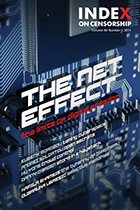
This article is taken from the current issue of Index on Censorship magazine, The Net Effect. Click here to subscribe
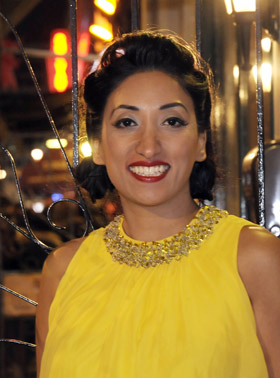
 While many fled, Syrian-native journalist Zaina Erhaim returned to her war-ravaged country in 2013 to ensure those left behind were not forgotten. She is now one of the few female journalists braving the twin threat of violence from both IS and Syrian president, Bashar al-Assad.
While many fled, Syrian-native journalist Zaina Erhaim returned to her war-ravaged country in 2013 to ensure those left behind were not forgotten. She is now one of the few female journalists braving the twin threat of violence from both IS and Syrian president, Bashar al-Assad. Arts nominee Sakdiyah Ma’ruf is a stand-up comedian from Indonesia whose routines challenge Islamic fundamentalism. Born to a conservative Muslim family in Java, Ma’ruf went against her father’s wishes and started using comedy to speak about religious-based violence and extremism, ethnic extremism and xenophobia, as well as fear, terror and violence against women.
Arts nominee Sakdiyah Ma’ruf is a stand-up comedian from Indonesia whose routines challenge Islamic fundamentalism. Born to a conservative Muslim family in Java, Ma’ruf went against her father’s wishes and started using comedy to speak about religious-based violence and extremism, ethnic extremism and xenophobia, as well as fear, terror and violence against women. Artist Tania Bruguera was arrested after an attempt to stage her performance piece #YoTambienExijo in Havana in late 2014. Mounted soon after the apparent thaw in US-Cuban relations, Bruguera’s piece offered members of the public the chance of one minute of “censor-free” expression in Havana’s Plaza de la Revolución.
Artist Tania Bruguera was arrested after an attempt to stage her performance piece #YoTambienExijo in Havana in late 2014. Mounted soon after the apparent thaw in US-Cuban relations, Bruguera’s piece offered members of the public the chance of one minute of “censor-free” expression in Havana’s Plaza de la Revolución. Campaigning nominee nineteen-year-old Vanessa Berhe continues to fight for the release of her uncle, journalist Seyoum Tsehaye, who has been imprisoned in Eritrea for the last 15 years. She also launched the campaign Free Eritrea to draw the world’s attention to a little-reported country with one of the worst track records for free speech.
Campaigning nominee nineteen-year-old Vanessa Berhe continues to fight for the release of her uncle, journalist Seyoum Tsehaye, who has been imprisoned in Eritrea for the last 15 years. She also launched the campaign Free Eritrea to draw the world’s attention to a little-reported country with one of the worst track records for free speech. Lina Attalah, chief editor, is just one of the women and men — friends and journalists — who in 2013 founded an independent news collective Mada Masr after newspaper Egypt Independent was censored into bankruptcy. Mada Masr was launched as a media co-operative that aims to hold those in power accountable.
Lina Attalah, chief editor, is just one of the women and men — friends and journalists — who in 2013 founded an independent news collective Mada Masr after newspaper Egypt Independent was censored into bankruptcy. Mada Masr was launched as a media co-operative that aims to hold those in power accountable. Bolo Bhi are a digital campaigning group who have orchestrated an impressive ongoing fight against attempts to censor the internet in Pakistan. The all-women management team have launched internet freedom programmes, published research papers, tirelessly fought for government transparency and run numerous innovative digital security training programmes.
Bolo Bhi are a digital campaigning group who have orchestrated an impressive ongoing fight against attempts to censor the internet in Pakistan. The all-women management team have launched internet freedom programmes, published research papers, tirelessly fought for government transparency and run numerous innovative digital security training programmes. Belarus Free Theatre, co-founded by Natalia Kaliada, have been using their creative and subversive art to protest the dictatorial rule of Aleksandr Lukashenko for a decade. Despite pressure from authorities since their inception, the group thrived underground, with performances in apartments, basements and forests despite continued arrests and brutal interrogations. In 2011, while on tour, they were told they were unable to return home. Refusing to be silenced, the group set up headquarters in London and continued to direct projects in Belarus.
Belarus Free Theatre, co-founded by Natalia Kaliada, have been using their creative and subversive art to protest the dictatorial rule of Aleksandr Lukashenko for a decade. Despite pressure from authorities since their inception, the group thrived underground, with performances in apartments, basements and forests despite continued arrests and brutal interrogations. In 2011, while on tour, they were told they were unable to return home. Refusing to be silenced, the group set up headquarters in London and continued to direct projects in Belarus.
